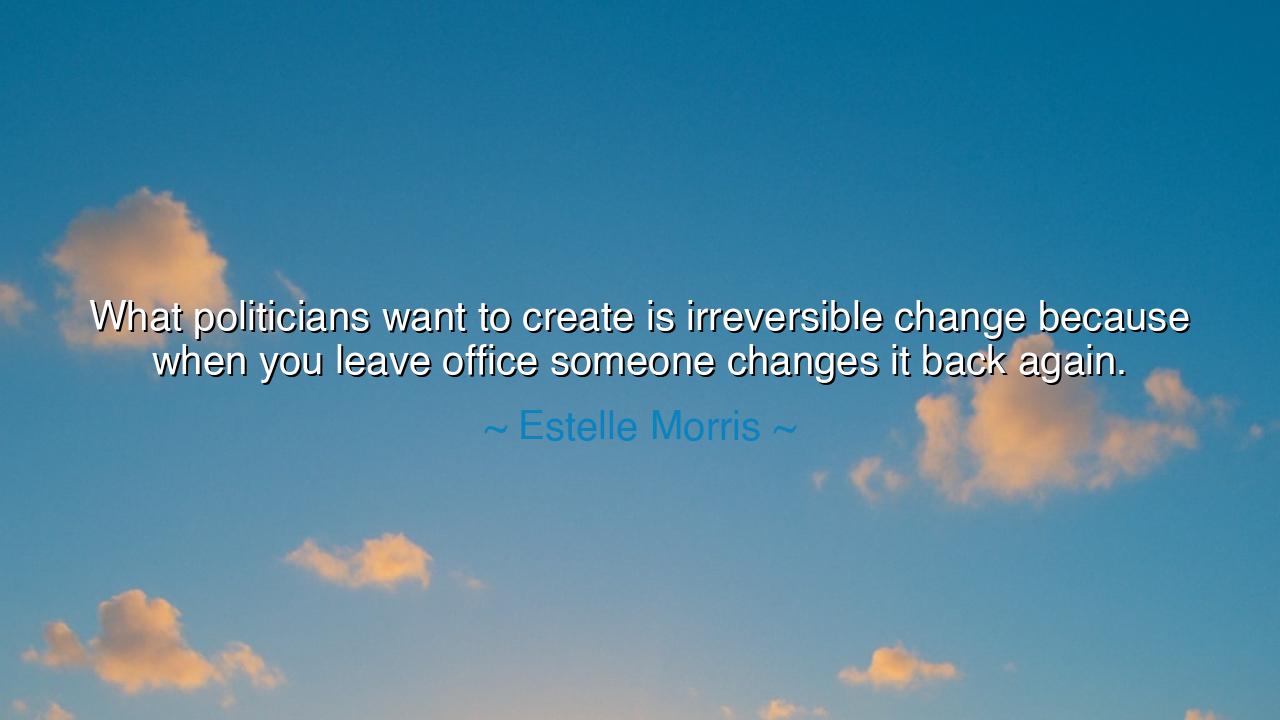
What politicians want to create is irreversible change because
What politicians want to create is irreversible change because when you leave office someone changes it back again.






The words of Estelle Morris — “What politicians want to create is irreversible change because when you leave office someone changes it back again.” — strike with the voice of experience, carrying both wisdom and lament. They unveil the fleeting nature of power, where laws are written in ink but erased in the next season, where visions rise only to be undone by the hands of successors. In this fleeting dance of authority, Morris reminds us that the true dream of every leader is to build what cannot be undone, to carve in stone rather than sketch in sand.
The meaning of her words lies in the struggle between permanence and impermanence. A politician may labor for years to bring reform, yet a single new administration may undo it with the stroke of a pen. Thus, the highest calling of governance is not merely to pass measures, but to create irreversible change, change so rooted in the people’s lives and hearts that no one dares unravel it. Only then does leadership transcend its term, and the work outlive the worker.
History offers many lessons. Recall the reforms of Franklin D. Roosevelt, whose New Deal in the 1930s redefined the bond between citizen and state. Though bitterly opposed by many, the institutions he forged — Social Security, labor protections, public works — became so woven into the fabric of American life that they could not be stripped away without tearing the nation itself. Roosevelt achieved what Morris spoke of: irreversible change, carried forward by the will of the people, surviving long after his hand had stilled.
Yet there are also stories of the opposite — of reforms swiftly overturned. Consider the struggle over civil rights in the United States, where victories hard-won were often met with backlashes seeking to erode them. Each generation learned anew that if change is not rooted deep, it risks being swept away when the tides of power shift. Morris’s words echo this truth: the test of leadership is not what you do in office, but whether it endures once you are gone.
Let this be the teaching for those who would lead: seek not applause, nor the passing glory of decrees, but the lasting power of transformation. Build foundations that future rulers cannot uproot, carve laws upon the conscience of the people, and let your work stand as an unshakable monument. For in the end, the legacy of a politician is not measured in speeches or promises, but in the irreversible change that survives them, speaking to generations yet unborn.






NN35 Truong Nguyen Ngoc
This quote touches on a common tension in politics—the desire to leave a lasting legacy. But if policies are constantly undone by the next administration, is it even possible for any politician to truly create meaningful, irreversible change? Shouldn’t we aim for change that benefits society long after the political figures who enacted it are gone, rather than changes that are simply designed to withstand political shifts?
LNKim Ngan Luu Ngoc
Estelle Morris seems to be suggesting that politicians prioritize their legacy over practical, sustainable reforms. Does this mindset discourage collaborative governance? If leaders are solely focused on creating irreversible changes, how do we foster cooperation and compromise for the greater good of society? Would it be more beneficial for politicians to focus on changes that are flexible and adaptable rather than permanent?
NHNguyen Hanh
This quote makes me reflect on how much political decisions are influenced by the desire for permanence. But can we truly expect any change to be irreversible in a democracy? Isn’t part of democracy the ability to reevaluate and adjust policies over time? While some changes may have long-term benefits, shouldn’t we accept that change is often a continuous, evolving process rather than something fixed and unalterable?
TBNguyen Thai Binh
I find Estelle Morris’s observation quite cynical yet realistic. Politicians often seem to push through changes with the idea of making them irreversible, but what happens when their successors reverse them? Does this undermine the trust in political institutions and policies? How can we ensure that important reforms are made with broad, bipartisan support so that they’re not just fleeting efforts that disappear with the next administration?
HTHuyen Tran
This quote highlights the transient nature of political change. Is it healthy for a society when changes are made that are so dependent on individual politicians, rather than long-lasting reforms? Could this mindset be contributing to political instability, as policies constantly shift depending on the ruling party? Shouldn’t we prioritize creating systems that are more enduring and less vulnerable to change with each new leadership cycle?